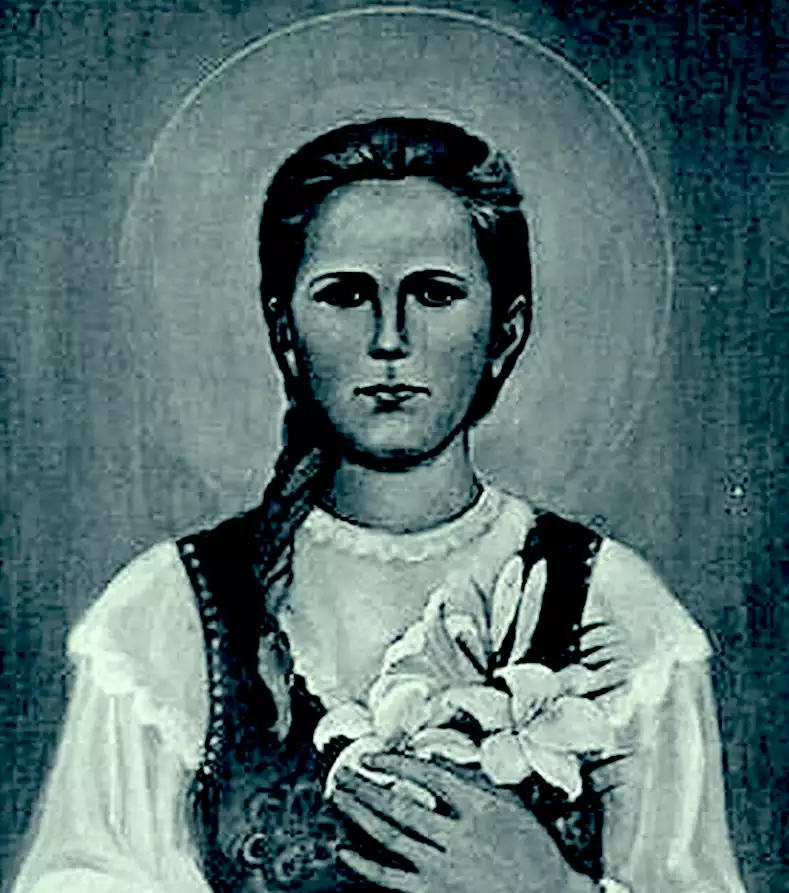
Blessed Karolina Kózka (1898-1914) was a young Polish woman renowned for her deep Catholic faith and commitment to remaining chaste. She grew up attending church regularly and often gathered neighbors to read scripture and pray. When she was 16 years old, during the chaos of World War I, Kózka was killed while resisting the advances of a Russian soldier. She chose death rather than compromise her vow to remain a bride of Christ. Kózka was beatified in 1987 and is considered a patron saint of purity and chastity.
Devout Upbringing and Vibrant Faith
Saint Karolina Kózka was born in 1898 into a devout Polish Catholic family in the small rural village of Wał-Ruda. The religious atmosphere in the Kózka household was palpable, with family members regularly praying together in the mornings and evenings. They often sang hymns and recited the Little Office of the Blessed Virgin Mary.
Young Karolina absorbed and embodied the lively spiritual environment she was raised in. From a very early age, she would gather neighborhood children under a pear tree and read scripture to them. During Lent, she led passionate recitations of the Lord’s Passion. At Christmastime, Kózka taught local children joyous carols to celebrate the nativity of Jesus Christ.
Kózka attended Sunday Mass without fail, often making the long walk to church more than once a week. She received her First Communion in 1907 which only intensified what was already a fiery Catholic spirituality within her. Rosary beads given to her by her mother were a fixture dangling from her hands; she was known to pray the rosary repetitively with an almost mystical devotion late into the night.
The local priest and villagers alike noted Kózka’s spiritual precocity and vibrancy. By her teenage years, neighbors had dubbed the Kózka residence “the little church” thanks to young Karolina’s habit of transform into a small chapel where hymns could be heard drifting through open windows. Some went as far as calling her “an angel.” Her contagious and sympathetic faith inspired those around her.
Due to her uncle Franciszek Borzęcki’s position as the village librarian, Kózka often aided him in caring for the local Catholic library. This gave her access to an array of spiritual materials she eagerly consumed. It was the beginnings of what would be a lifelong commitment to studying scripture and the lives of saints.
A Violent Death and Enduring Legacy
In November 1914, Saint Karolina Kózka’s peaceful life was shattered by the onset of World War I. The German and Austro-Hungarian alliance was pitted against Russia and its allies. Soon the Russian Imperial Army overtook much of Poland, including Kózka’s small farming village of Wał-Ruda.
Polish citizens came face to face with the harsh realities of war as Russian soldiers raided homes and terrorized citizens. Disturbing accounts began to circulate of soldiers assaulting and raping Polish women. Kózka’s neighbors lived in fear, especially young women like 16-year-old Karolina.
On November 18, 1914, an armed Russian soldier arrived at the Kózka family farm during breakfast. He demanded Kózka and her father accompany him out of the house to the edge of a nearby forest. It soon became clear his intentions for young Karolina were nefarious.
As the frightened father fled home, abandoning his daughter with the soldier, two young Polish men watched in horror from behind bushes as the scene unfolded. The soldier violently attempted to rape Kózka, whose deep Catholic faith and values compelled her to refuse him.
Enraged by the teenage girl resisting his sexual advances, the soldier stabbed Kózka repeatedly with his bayonet. Bleeding profusely, she broke away and desperately ran towards a nearby swamp before collapsing, mortally wounded.
The two hidden witnesses recounted the horrific story to Kózka’s family and villagers. Her vicious murder at the hands of a Russian soldier rapidly intensified existing anti-Russian sentiment. Kózka was hailed as a martyr, having sacrificed her earthly life to defend her principles and remain spiritually faithful to Christ.
Over 3,000 villagers attended Kózka’s funeral on December 6, 1914. In the years following her death, a devoted cult emerged celebrating her as a symbol of Polish nationalism. Churches displayed paintings and sculptures in her honor. Books, poems, and plays told her story. Her death at the hands of a foreign soldier resonated powerfully with the Polish people.
Nearly 75 years after her tragic death, Karolina Kózka was beatified in 1987 by the first-ever Polish pope, John Paul II. She is remembered as a patron saint of Polish nationalism and martyr for chastity. The site of her death remains a pilgrimage site decorated with flowers offered in her honor.
Blessed Karolina Kózka lived a tragically short but spiritually impactful life. Her steadfast devotion to Catholic principles and Polish nationalism established her as a resonant icon. Nearly ninety years after her death, Karolina Kózka remains a revered symbol of faith and martyrdom. Her memory represents victory of the soul over earthly evils. She is celebrated both as a patron saint of purity and an embodiment of Polish patriotism.
References
Johnston, B. (2019). Female Saints: A children’s encyclopedia. Pauline Press.
Rejowska, A. (2024, January 24). The besieged fortress? Urban, highly educated and highly religious: female members of Catholic groups in contemporary Poland.
Skworc, W. (2002). Shrines of the Tarnów Diocese. Towarzystwo Słowaków w Polsce.
Tarnów Diocese. (1965). Informative process for the cause of beatification and canonization. The Roman Catholic Church.
Zięba, J. (2019). Blessed Karolina Kózka. Wydawnictwo Archidiecezji Krakowskiej.
